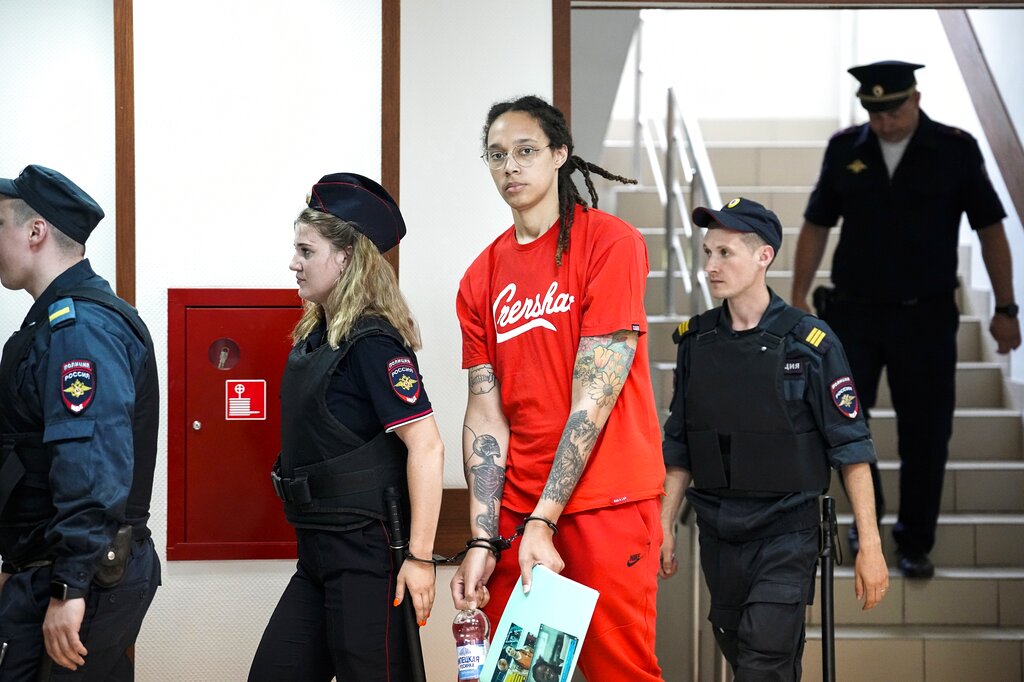
By Jim Heintz, Associated Press
But Russian courts often move slowly, Russian resentment over the high-profile case could obstruct a deal and the fate of an American imprisoned for espionage may be critical to freeing Brittney Griner.
Here’s a look at the case against the basketball star and its complications.
WHAT ARE THE CHARGES?
Griner, a standout for the WNBA’s Phoenix Mercury and a two-time Olympic gold medalist, was arrested in February at Moscow’s Sheremetyevo Airport after vape canisters with cannabis oil were allegedly found in her luggage. She faces up to 10 years in prison on charges of large-scale transportation of drugs.
She admitted guilt Thursday, July 7, in the second session of her trial, but said she had no criminal intent and that the canisters were there because she had packed hastily.

WHAT’S THE NEXT STEP?
Griner’s admission makes a conviction certain, but that may not come quickly. The next session of the trial is set for July 14, and it is unclear if that will conclude testimony.
Even if it does, a verdict would not come immediately: Russian court verdicts are not simple pronunciations, but laboriously detailed recaps of testimony and evidence, which are time-consuming to prepare and can take hours to read aloud.
If the court accepts Griner’s claim that she was careless rather than criminal, it might hand her a suspended sentence. Suspended sentences can also be politically driven, as when opposition leader Alexei Navalny received one in an embezzlement case. However, that might oblige her to stay in the country.
A conviction would be a prerequisite to arranging a prisoner exchange. It would also allow Griner to apply for a presidential pardon.
“It is clear that we have not completed the necessary judicial procedures. Until this happens, there are no nominal, formal, procedural grounds for any further steps, not to mention anything else,” Deputy Foreign Minister Sergei Ryabkov said Thursday.
IS A PRISONER EXCHANGE IN THE WORKS?
Russian media consistently suggest that Griner could be exchanged for Russian arms trader Viktor Bout, who is serving a 25-year sentence in the U.S. for conspiracy to kill American citizens and providing aid to a terrorist organization. Russia has agitated for Bout’s release for years. But the wide discrepancy between Griner’s cannabis offense and Bout’s global dealings in deadly weapons could make such a swap unpalatable to Washington.
The United States has agreed to asymmetric swaps with Russia before. In 2010, the United States exchanged 10 Russian “sleeper agents,” including the glamorous Anna Chapman, for four Americans who confessed to spying.
In April, there was a numerically equivalent exchange but of prisoners serving notably different sentences. American Trevor Reed, who was convicted of assaulting a police officer while intoxicated, was swapped for Konstantin Yaroshenko, who is serving 20 years for extensive cocaine smuggling.
Although Russia has been eager for Bout’s release, Ryabkov complained that “attempts by the American side to make noise in public…don’t help the practical settlement of issues.”
IS PAUL WHELAN A WILD CARD?
Whelan, a corporate security executive, was arrested in Moscow in 2018 and sentenced to 16 years in prison for espionage. The case has been less publicized than Griner’s, but after the Reed-Yaroshenko exchange, the United States would be under pressure to avoid another one-for-one swap that does not include Whelan.
However, because Whelan’s espionage conviction is more serious and for a longer term than what Griner faces, that could balance an equation that would make trading both of them for Bout conceivable.
“The U.S. needs to find a concession that Russia will accept in order to return either or both Brittney Griner and Paul Whelan,” his brother David told The Associated Press.
_________________
READ MORE LIKE THIS:
WNBA’s Griner Pleads Guilty at Her Drug Trial in Russia
WNBA star Brittney Griner’s release still uncertain as her trial begins in a Russian court
State Dept.: Brittney Griner considered wrongfully detained


